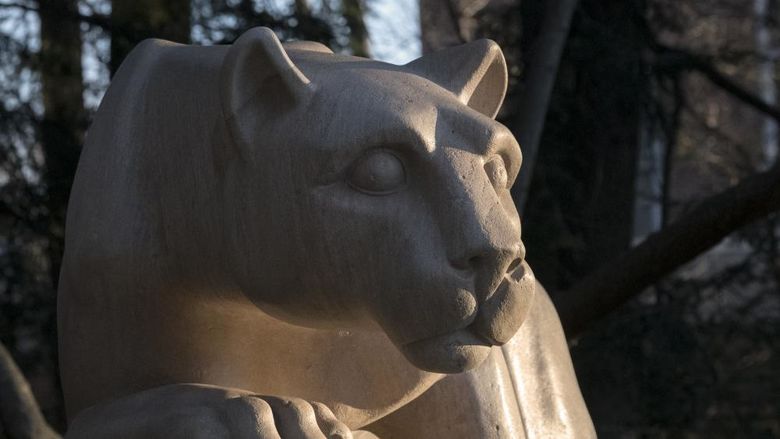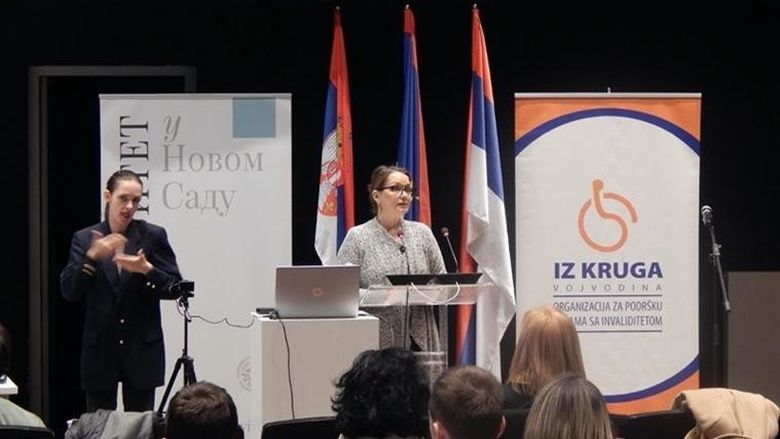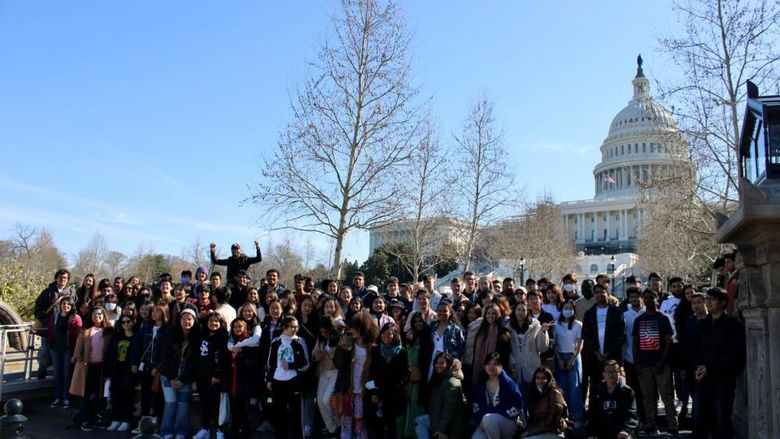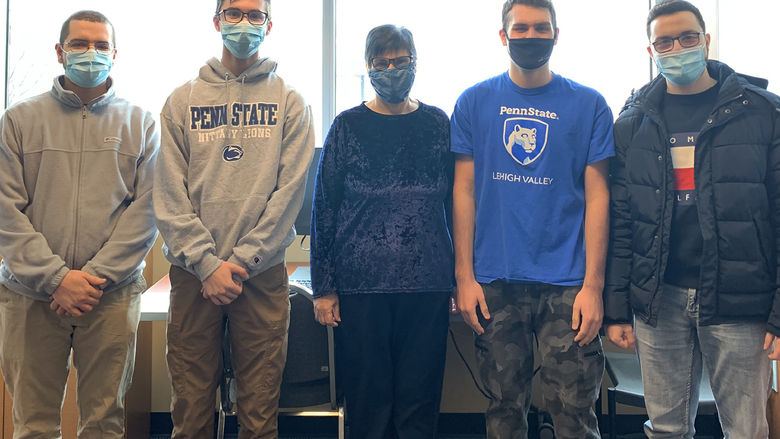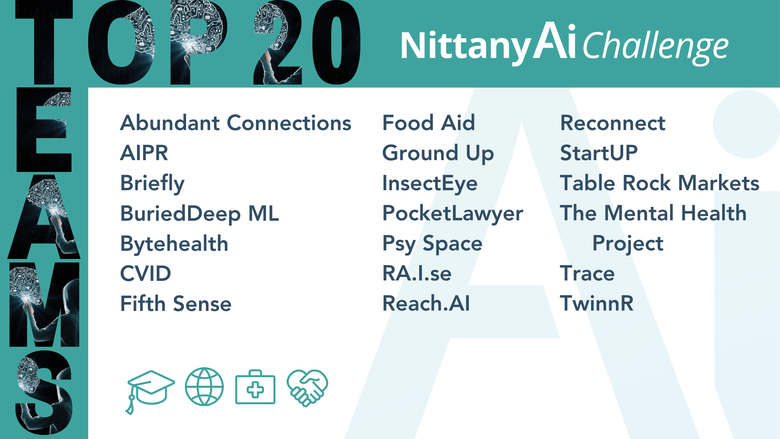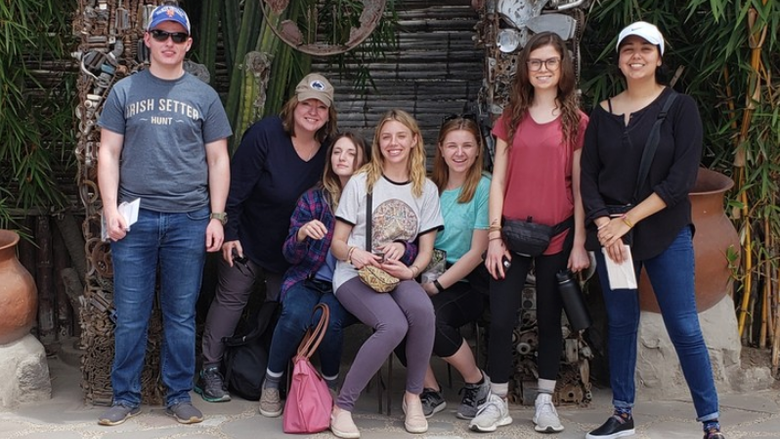
Penn State Lehigh Valley Associate Professor of Biology Jacqueline McLaughlin, pictured here in Romania, recently received the National Society for Experiential Education (NSEE) 2022 John S. Duley Lifetime Achievement Award in Experiential Education. And, in early June, she delivered a virtual keynote address to attendees at the FarmConect Romania agriculture conference held in Slobozia, Romania.
CENTER VALLEY, Pa. — Penn State Lehigh Valley Associate Professor of Biology Jacqueline McLaughlin’s commitment to teaching and research has resulted in a few high-profile accolades of late.
McLaughlin recently received the National Society for Experiential Education (NSEE) 2022 John S. Duley Lifetime Achievement Award in Experiential Education. In addition, in early June she delivered a virtual keynote address to attendees at the FarmConect Romania agriculture conference held in Slobozia, Romania. The talk centered around her work as director of Penn State’s CHANCE (Connecting Humans And Nature through Conservation Experiences) program.
The NSEE award recognized McLaughlin for a lifetime of sustained contributions to “the development of the philosophy and practice of experiential education and to the advancement of that field." Award winners “have done so while demonstrating professional integrity, humanitarian regard, ethical concern, standards of excellence, informed knowledge, leadership, service, dedication, and recognized scholarship/practice,” according to the NSEE.
McLaughlin will receive the award in late September at the NSEE’s annual conference in Salt Lake City. She was nominated for it by Penn State Emeritus Professor of Biology Stam Zervanos.
“My nomination was based on the excellence of both Dr. McLaughlin’s national and international contributions and achievements over the course of her career in the development and practice of experiential education,” Zervanos said. “In my opinion, she has been a trailblazer for the development of evidence-based science education practices that incorporate undergraduate research. Dr. McLaughlin’s quest has been to improve the quality of science education for students by developing and offering alternatives to conventional biology instruction.”
McLaughlin said she was honored to receive the award.
“I have devoted my life’s work to higher education and striving to create traditional classrooms and non-traditional field-based experiences that expound the philosophy of experimental education,” she said. “When students are engaged in real-world, hands-on experiences that allow them to pose questions, investigate, experiment, solve problems, take responsibility, be creative and contribute to society, I believe they define the well-rounded student that our institution endeavors to graduate. These students have the knowledge, skills, values and capacity to fulfill their potential and better our world.”
Organized by the Romanian Maize Growers Association in partnership with Slobozia municipality, FarmConect Romania featured three days of workshops on topics including regenerative agriculture and soil health. The U.S. Embassy in the Romanian capital of Bucharest put the conference’s organizers in touch with McLaughlin on account of her work as director of the CHANCE program, which for the past several years has focused on interdisciplinary water issues confronting the sustainability of the Danube Delta.
McLaughlin recorded her speech with assistance from Corey McDonough of the campus’s Multimedia Innovation Center.
“To have served as an Embassy Science Fellow to the U.S. Department of State, Embassy Bucharest in 2020 was truly a privilege and a paramount opportunity for Penn State CHANCE,” McLaughlin said. “Since fulfilling my service, I not only continue to work with the U.S. Embassy Bucharest in the arena of science diplomacy to create American and Romanian educational partnerships in environmental education, but also to promote real change in policy and practices that work to sustain the waters of the Danube River and its delta. My voice to the farmers and related agricultural stakeholders who utilize this watershed at the recent FarmConect conference held in Romania’s breadbasket was a plea for the use of more sustainable farming practices from CHANCE Penn State and University of Romania students.”
Eleven Penn State students — three from PSU-LV and eight from other campuses — were chosen to take part in the binational, two-part CHANCE program this year. They engaged in online instruction during the spring semester, and later this month they’ll travel with McLaughlin and other Penn State faculty to Romania to collaborate with 11 students and several faculty members from the University of Bucharest.
While there, the students will engage in field research that will include designing independent experiments, collecting, recording and interpreting data, and presenting their research findings at an international symposium. In addition to improving their research skills, the students will have the opportunity to enhance their networks, workforce “soft” skills and global competencies. And they’ll be able to build their resumes and prepare themselves for the next steps in their academic and professional careers.
For additional information on the CHANCE program, visit www.chancepsu.org.
About the Penn State CHANCE Program
The Penn State CHANCE Program is a distinctive educational model which combines study abroad with embedded opportunities for undergraduate research in environmental sustainability. The goal of CHANCE is to prepare global-minded citizens who understand the importance of restoring and protecting the biodiversity of our planet's ecosystems, and who are equipped to address the challenges of our time such as energy, air, food, water and climate change in their lifetimes. Because ecosystems cross national borders, CHANCE strives to define sustainable answers for environmental realities from a global perspective.
